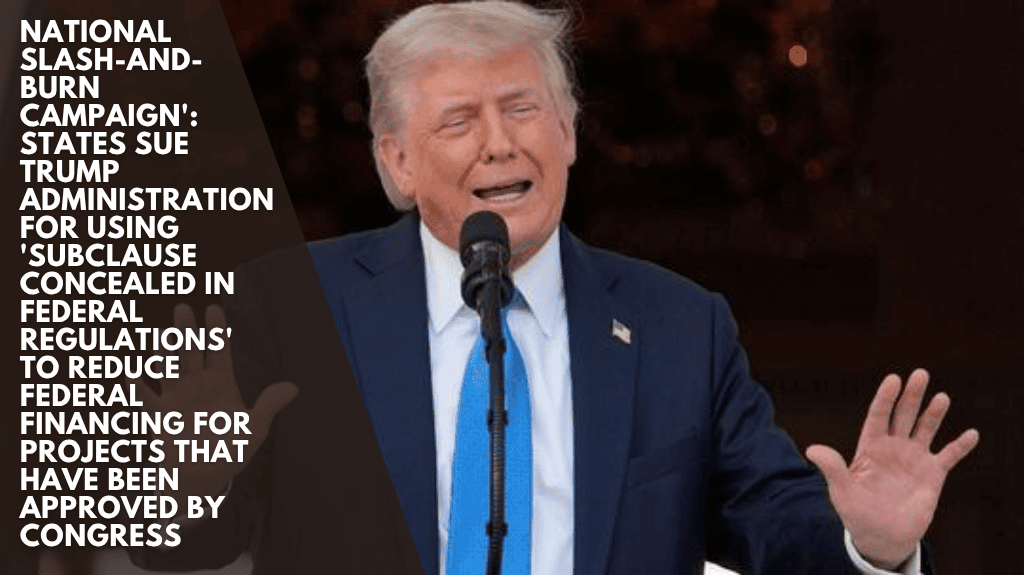A group of states is suing the Trump administration over plans to cut billions of dollars in previously allocated federal funds.
In an 80-page complaint, New Jersey, along with 20 other states and Washington, D.C., claims the federal government, led by the Office of Management and Budget (OMB), “has mounted an unprecedented and unlawful campaign” to cut congressionally-appropriated funds based on “a single subclause buried in federal regulations.”
The lawsuit claims that “this nationwide slash-and-burn campaign” is a misinterpretation of the regulation itself, and that the government is violating the Administrative Procedure Act (APA), the federal statute governing administrative agencies, in at least two ways.
The Trump administration has cited 2 C.F.R. §200.340(a)(4), a regulation that says funding can be terminated “if an award no longer effectuates the program goals or agency priorities.”
Perhaps most notably, the regulation in question is an internal rule — not a statute — that governs OMB’s behavior in a section that provides guidance to other administrative agencies.
The states claim that the government has used the clause to give agencies “virtually unrestricted authority to withhold federal funding any time they no longer wish to support the programs for which Congress has appropriated funds.”
“And it has made a concerted decision, reflected in its uniform practice across a wide range of federal agencies, to invoke the Clause as grounds for terminating billions of dollars of federal funding to Plaintiffs,” the allegation continues.
The lawsuit contends that this interpretation of the clause “is a dramatic departure from past practice and the OMB’s own interpretation.”
The clause is relatively new, having been created by the OMB in 2020.
According to the lawsuit, the agency has long understood the clause to apply only sparingly and in very specific circumstances.
From the filing, in detail:
At that time, it made clear that the Clause granted federal agencies only limited authority to terminate grants. OMB explained that the Clause permitted federal agencies to terminate grants where, for instance, “additional evidence reveals that a specific award objective is ineffective at achieving program goals,” or where “additional evidence . . . cause[s] the Federal awarding agency to significantly question the feasibility of the intended objective of the award.” At the same time, OMB clarified in its final guidance that, under the Clause as written, agencies “are not able to terminate grants arbitrarily.” OMB reiterated that purpose of the Clause in 2024, when it was revised to provide that an award could be terminated “pursuant to the terms and conditions of the Federal award, including, to the extent authorized by law, if an award no longer effectuates the program goals or agency priorities.”
According to the states, the Trump administration is now simply using the clause to cut funding on a massive scale, citing its authority conclusively “without any attempt to identify why the grants did not align with the agency priorities that were identified at the time of the grant award.”
This interpretation of the clause is entirely new, dating back to the second Trump administration and its policy of massive funding cuts influenced by the United States Department of Government Efficiency.
“Consistent with OMB’s [past] guidance, Plaintiffs accepted federal grants with no notice or indication whatsoever that the federal government could change its priorities and terminate grants on a whim,” according to the complaint. “Indeed, Plaintiffs are not aware of a single instance prior to January 2025 in which a federal agency relied on the Clause to terminate a grant on the grounds that agency priorities had changed after the award of the grant.”
According to the lawsuit, these cuts are both significant and illegal.
“The results have been devastating,” the complaint continues. “With the stroke of a pen, federal agencies have deprive states of critical funding that they rely on to combat violent crime and protect public safety, equip law enforcement, educate students, safeguard public health, protect clean drinking water, conduct life-saving medical and scientific research, address food insecurity among students in school, ensure access to unemployment benefits for workers who lose their jobs, and much more. Federal agencies have done all of this without prior notice, without explanation to State recipients, and in direct violation of Congress’ will.”
The states argue that the Trump administration’s use of the clause to cut such substantial funds is unconstitutional.
Again, the filing is lengthy:
Defendants’ expansive interpretation of the Clause and the Agency Defendants’ parallel regulations incorporating the Clause would violate the separation of powers by effectively creating a backdoor to unlawful impoundment. Where Congress has appropriated funds and directed that they be spent on particular grant programs, terminating those grants based on changed agency priorities has the effect of unlawfully impounding and refusing to spend Congressionally appropriated funds. By the same token, where Congress has appropriated funds and directed that they be spent on a particular objective, yet the agency terminates grants because it has substituted new priorities for the objective Congress set out by statute, that too has the effect of unlawfully impounding Congressionally appropriated funds for the objectives Congress itself identified.
The lawsuit goes on to argue that such a “unlawful” use of the clause violates the APA two times. First, the plaintiffs claim that the use of the clause violates the law, implying that the action is not permissible under the APA.
Second, the plaintiffs argue that the interpretation is arbitrary and capricious, a term that refers to government actions that go too far and disregard formal processes, whether internal rules or broader statutory laws.
Importantly, the plaintiffs do not seek an injunction to recoup any of the canceled awards. Rather, they are requesting a declaratory judgment that “regulations incorporating the Clause do not independently authorize the terminations of awards based on a failure to effectuate agency priorities identified after the grant was awarded.”












